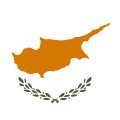| President of the Republic of Cyprus | |
|---|---|
| Πρόεδρος της Κυπριακής Δημοκρατίας (Greek) Kıbrıs Cumhuriyeti Cumhurbaşkanı (Turkish) | |
 Presidential standard of Cyprus | |
| Executive branch of the Government of Cyprus | |
| Style | Mr President (informal) His Excellency (diplomatic) |
| Status | Head of state Head of government Commander-in-chief |
| Member of | European Council |
| Residence | Presidential Palace, Presidential Cottage (Troodos) |
| Seat | Nicosia, Cyprus |
| Appointer | Popular vote |
| Term length | Five years, renewable once consecutively |
| Constituting instrument | Cypriot Constitution (1960) |
| Formation | 16 August 1960 |
| First holder | Makarios III |
| Deputy | Vice President of Cyprus (de jure) President of the House of Representatives (de facto) |
| Salary | €132,000 annually [1] |
| Website | www |
 |
|---|
The president of Cyprus, officially the president of the Republic of Cyprus, [a] is the head of state and the head of government of Cyprus, as well as the commander-in-chief of the Cypriot National Guard. The office was established by the Constitution of 1960, after Cyprus gained its independence from the United Kingdom.
Contents
- Powers and limitations
- List of officeholders
- Timeline
- Latest election
- Statistics
- See also
- Notes
- References
- External links
The combination of the role of head of state and that of government is unique among member states of the European Union, making Cyprus the only EU state with a full presidential system of government.
The constitution, which was negotiated during the London and Zürich Agreements that divided power between the Greek Cypriot community and Turkish Cypriot community, requires the president to be a Greek Cypriot. Other requirements are that the officeholder must be over the age of thirty-five and elected directly in a two-round system. The president's term lasts for five years, and in accordance with the thirteenth amendment to the constitution, no person can serve more than two consecutive terms.
Nikos Christodoulides is the eighth and current president of Cyprus, having assumed office on 28 February 2023.










